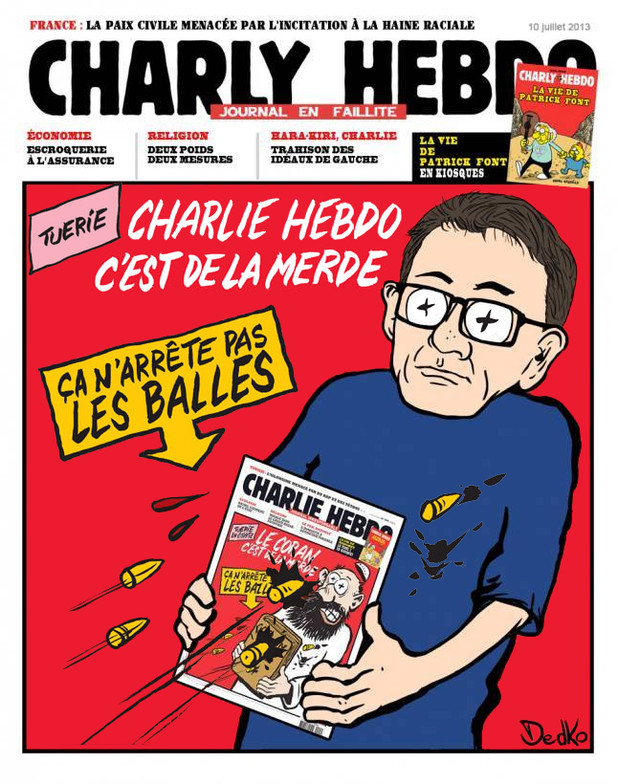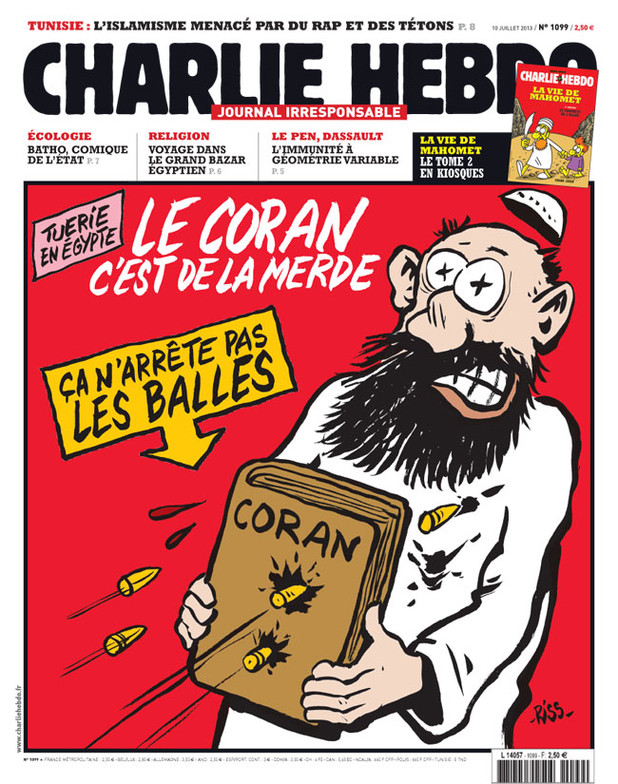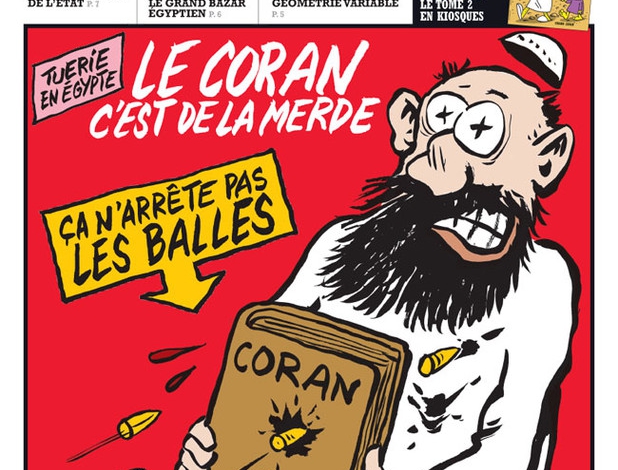 Mock Charlie Hebdo cover circulated after the murder of the magazine�s cartoonists. The text says �Charlie Hebdo is shit. It doesn�t stop bullets.�[/caption]
Mock Charlie Hebdo cover circulated after the murder of the magazine�s cartoonists. The text says �Charlie Hebdo is shit. It doesn�t stop bullets.�[/caption]It may sound like an ironic joke, but it isn�t. Less than a week after the massive rallies in defense of �free expression,� following the murders of the�Charlie Hebdocartoonists, French authorities have jailed a youth for irony.
The arrest is part of a harsh crackdown on free speech in the country that has prompted criticism from national and international human rights organizations.
A 16-year-old high school student was taken into police custody on Thursday and indicted for �defending terrorism,� national broadcaster France 3�reports.
His alleged crime? He posted on Facebook a cartoon �representing a person holding the magazine�Charlie Hebdo, being hit by bullets, and accompanied by an �ironic� comment,� France 3 states.
The report does not include the drawing � presumably that could put France 3 afoul of the law. So we do not know for sure what the youth is accused of sharing.
But the cartoon at the top of this page fits the description precisely. It was widely shared on social media, and�published on 7 January�on the website of the controversial French comedian�Dieudonn�. It is a mock�Charlie Hebdo�cover by the cartoonist Dedko.
[caption id="" align="alignright" width="223"]
 An actual Charlie Hebdo from July 2013 caused outrage for mocking Egyptian protestors killed after the military coup. The text says �The Quran is shit. It doesn�t stop bullets.�[/caption]
An actual Charlie Hebdo from July 2013 caused outrage for mocking Egyptian protestors killed after the military coup. The text says �The Quran is shit. It doesn�t stop bullets.�[/caption]�
The text says �Charlie Hebdo�is shit. It does not stop bullets.� It appears quite heartless and cruel, but look at the copy ofCharlie Hebdo�that the person in the cartoon is holding.
It represents a real�Charlie Hebdo�cover that was published in July 2013, days after the military coup in Egypt. It caused outrage at the time because of its cruelty and insensitivity.
It shows an Egyptian protestor being shot through a copy of the Quran he is holding. The text says, �The Quran is shit, it doesn�t stop bullets.�
Assuming that the mock�Charlie Hebdo�cover is the one shared by the youth on Facebook, this incident sums up the sheer hypocrisy of France�s current national mood.
Anything mocking and denigrating Islam and Muslims is venerated as courageous free speech, while anything mocking those who engage in such denigration � even using precisely the same techniques � can get you locked up.
Wave of arrests
�A string of at least 69 arrests in France this week on the vague charge of �defending terrorism� (�l�apologie du terrorisme�) risks violating freedom of expression,� Amnesty International said in an understated�press release�on Friday.
�All the arrests appear to be on the basis of statements made in the aftermath of the deadly attacks against the magazine�Charlie Hebdo, a kosher supermarket and security forces in Paris on 7 and 9 January,� the human rights group added.
�Some of the recently reported cases in France may cross the high threshold of expression that can legitimately be prosecuted,� Amnesty said. �Others, however offensive the statements made, do not.�
As�previously reported, the most high profile arrest was of Dieudonn� himself � also apparently for an ironic comment.
Many of the arrests are simply absurd, and it is impossible to imagine what purpose they could serve other than to allow the French government to look tough amid an increasingly right-wing and xenophobic political atmosphere, and to satisfy a desire in some sections of the public and media for scapegoats.
They include:
- A 14-year-old girl�charged with �defending terrorism.� She allegedly shouted at a tram conductor: �We are the Kouachi sisters, we�re going to grab our Kalashnikovs.� Cherif and Said Kouachi are two French brothers authorities say carried out theCharlie Hebdo�attack.
- A 21-year-old was caught without a ticket on a tram, and subsequently sentenced to ten months in prison for allegedly saying, �The Kouachi brothers is just the beginning; I should have been with them to kill more people,��according to Amnesty International.
- In the northern city of Lille, authorities�suspended three school workers�for allegedly refusing to observe a moment of silence in honor of the victims of the attacks, and then justifying their action. One is being�charged�with �defending terrorism.� The accused denies that he refused to respect the minute of silence, but said he did �debate it with colleagues outside work hours.�
- In Paris, one man who was drunk and another who suffers psychiatric problems were jailed for fourteen and three months respectively for �defending terrorism� for comments they made. A third was jailed for fifteen months and the�court ordered that their sentences begin immediately.
- In Bordeaux, police carried out a traffic stop. A�very drunk 18-year-old passenger�in the car allegedly hurled abuse at the police and made comments sympathetic to theCharlie Hebdo�attackers. She was charged with �defending terrorism� and sentenced to 210 hours of community service. Prosecutors had asked for a four-month jail term.
In almost every case where a name is provided, those arrested would appear to be of North African ancestry � suggesting that France�s crackdown is quite targeted.
If it is not calculated to further alienate the country�s large, young population of French citizens whose parents or grandparents came from the former colonies, there�s a good chance it will do that anyway.
The cases also suggest a pattern where minor encounters with police � with drunks and youths � quickly escalate into �terrorism�-related accusations. The fact that young people of color have long complained that they are targeted by police means that they are going to be disproportionately more vulnerable.
Double standard
Amnesty says the crackdown followed a circular sent to prosecutors on 12 January by justice minister Christiane Taubira instructing them that �words or wrongdoing, hatred or contempt, uttered or committed against someone because of their religion must be fought and pursued with great vigor.�
Although they might exist, I have yet to see cases of people being charged or jailed for anti-Muslim or other kinds of racist or bigoted comments under the �defending terrorism� law.
After the attacks, prominent journalist Philippe Tesson took to the airwaves of Europe 1, one of France�s biggest radio stations, and declared that Muslims were responsible for threatening the country�s vaunted secularism.
�It�s the Muslims who bring the shit to France these days,� he said.
While a private citizen has�reportedly brought a legal complaint against Tesson�for �inciting racial hatred,� the authorities have not charged him with a crime.
C�cile Duflot, a Green Party legislator, noticed the discrepancy and�urged�that �the reaction to the foul Islamophobic words of Philippe Tesson should be much stronger.�
(Update:�Le Parisien�reports today, Monday, that Paris prosecutors have opened an inquiry into Tesson on suspicion of �inciting hatred.�)
�Islamophobic� murder
Monitoring groups have collected reports of�at least 83 Islamophobic threats and attacks in France�since the�Charlie Hebdo�attack.
There were at least 21 incidents of shots or grenades being fired at buildings.
Police are investigating if the�murder of Mohammed El Makouli, a Moroccan man in the eastern town of Beaucet, was motivated by anti-Muslim hatred.
El-Makouli was stabbed seventeen times by a neighbor who invaded his home, allegedly shouting anti-Muslim slogans. El-Makouli�s wife was injured and his young son escaped the attack.
Draconian law
It may seem surprising that French authorities can charge and jail people so quickly. These summary trials and long custodial terms are the result of a change in the law last November in which the charge of �defending terrorism� became a criminal offense subject to fast-track trials.
Last week France�s Human Rights League�said�that when the change in the law was being debated, it had �demonstrated that it would be ineffective for security, dangerous for liberties and damaging to the credibility of the justice system.�
The organization said that the slew of summary convictions of �drunks and fools� vindicated its warnings.
Many of these people are now likely to end up on the state�s planned �antiterrorist register.�
Prosecution for song and book
Prosecutions for expression do not take place only under the �defending terrorism� law. This week the rapper Sa�dou of the band Z.E.P. and the sociologist Sa�d Bouamama will be indicted in Lille for �public insult� and �incitement to discrimination, hate, or violence.�
The prosecution was brought by a right-wing nationalist group, as�MR Zine�reports, because of Sa�d�s book�Fuck France�and a Z.E.P. song with the same title.
Z.E.P Nique la France
The song�s refrain states: �Fuck France and its colonialist past, its paternalist smells, stenches, and reflexes. Fuck France and its imperialist history, its capitalist walls, fortresses and delusions.�
Z.E.P., ironically, stands for �Zone d�expression populaire� � Popular Expression Zone. But irony is now a crime in France.
It is a matter of time before these laws are used with renewed vigor against a whole range of speech that might upset the French state, especially those who advocate for Palestinian rights and for the boycott of Israel.
�Obsessive pounding on Muslims�
With all I�ve read since the Paris attacks, a few items stand out as particularly thoughtful and informative.
A�2013 piece by Olivier Cyran, a former journalist at�Charlie Hebdo, traces the magazine�s descent into an obsessive bigotry against Muslims in the years since the 11 September 2001 attacks.
The piece, in the form of an open letter to the magazine�s editor St�phane Charbonnier, is an important rejoinder to the pervasive claims that�Charlie Hebdo�irreverently targeted everyone and that Muslims are just too sensitive.
Charbonnier is one of the cartoonists who was murdered.
�The obsessive pounding on Muslims to which your weekly has devoted itself for more than a decade has had very real effects,� Cyran wrote to Charbonnier.
�It has powerfully contributed to popularizing, among �left-wing� opinion, the idea that Islam is a major �problem� in French society. That belittling Muslims is no longer the sole privilege of the extreme right, but a �right to offend� which is sanctified by secularism, the Republic, by �co-existence.��
Myths of French secularism
�Commentators in France and elsewhere have taken the recent terrorist attacks in Paris as an occasion to reflect more broadly about Muslims in France,� observes Mayanthi Fernando, a professor of anthropology at University of California, Santa Cruz.
�Many read the attacks as a sign of French Muslims� refusal to integrate. They�ve asked whether Muslims can be fully secular and expressed doubt as to whether one can be both Muslim and French,� Fernando says in an article for�The Conversation.
She warns, �we should be wary of myths about French secularism (la�cit�) and French citizenship being spun in the aftermath of the attacks.�
Fernando notes that despite its ostensible�la�cit�, the French state has always privileged some religious groups. But when Muslims ask for the same accommodations others receive, �they are reminded that France is a secular country where proper citizenship requires separating religion from public life.�
All of this happens, Fernando notes, in a country where research demonstrates �nonwhite immigrants and their descendants as a group suffer systematic discrimination on the basis of their race, culture and religion.�
Although Muslims are�7.5 percent�of the general population in France, they are�60 percent of the prison population.
�Islam in Liberalism�
The broader debates about �Islam� and �democracy� or �Islam� and �secularism� are tackled in Joseph Massad�s new must-read book�Islam in Liberalism.
Massad argues that �American and European missionaries of liberalism� are engaged in a campaign to remake Islam and Muslims in their image, that is to say in the image of �liberal Protestant Christianity.�
�Muslim resistance to this benevolent mission is represented as rejection of modernity and liberal values of freedom, liberty, equality, the right-bearing individual, democratic citizenship, women�s rights, sexual rights, freedom of belief, secularism [and] rationality,� Massad writes.
�[I]f Muslims refuse to convert willingly,� Massad observes, �they must be forced to convert using military power, as their resistance threatens a core value of liberalism, namely its universality and the necessity of its universalization as globalization.�
�It�s hard to imagine a more necessary�and timely book,��says�Jonathon Sturgeon, literary editor at�Flavorwire.
I could not agree more.
By Electronic Intifada
The Iran Project is not responsible for the content of quoted articles.











